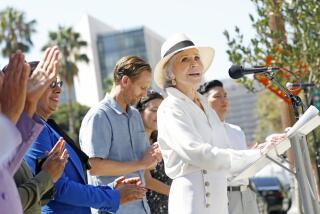Hanoi War Hero Pleads for Reform : Vietnam: Visiting in Paris, he takes to the radio to appeal for political pluralism and the decentralization of power.
PARIS — The Vietnamese Communist war hero who accepted the surrender of Saigon in 1975 now pleads in radio broadcasts for democratic reforms in his homeland.
Saying that Hanoi’s leadership must escape from narrow Marxist-Leninist dogma, Col. Bui Tin offered a grim New Year’s Day prediction from Paris.
“If we don’t change, there will be an explosion this year, because the people can’t take it anymore,” Tin said. “We must make a real opening, to do away with this bureaucracy, dogmatism, conservatism. . . . This has made such a misery among the people.”
Tin, 63, a protege of the legendary Ho Chi Minh, is a dedicated Communist and a national hero in his homeland, where he accepted the surrender of Saigon from Gen. Duong Van (Big) Minh.
Tin has been in France since late September, when he was invited by the Communist newspaper L’Humanite to participate in a seminar on the French military role in Indochina.
He stayed on, and since late November has taken to the airwaves of the British Broadcasting Corp.’s Vietnamese-language service each Saturday and Sunday in a series of taped interviews.
Tin has appealed for political pluralism, decentralization of power, foreign investment and an end to Vietnam’s global isolation.
He also hopes to persuade some of the 2 million Vietnamese who fled overseas in the past decade to return and help rebuild the country.
“We must open to France, to Japan, to the United States, to have normal relations with all our old enemies,” Tin said. “Our country needs real changes.”
An estimated 2 million Vietnamese listen to his broadcasts, which conclude this month.
Penniless in Paris, Tin depends on a nephew and friends for food. He would like to return to Vietnam in a few months, but acknowledges that it might be dangerous. The secret police in Hanoi have interrogated his wife and family, he said.
The son of a justice minister in the prewar imperial court, Tin broke with his family and joined Ho’s guerrilla army in 1945 to end French rule in Indochina.
A regimental commander at 27, Tin took part in the Viet Minh’s crushing defeat of the French at Dien Bien Phu in 1954 and fought against South Vietnam and its U.S. ally as a colonel and war correspondent for the army newspaper.
He helped supervise the withdrawal of U.S. troops from South Vietnam in 1973 and rode one of the first North Vietnamese tanks into Saigon on April 30, 1975.
More to Read
Sign up for Essential California
The most important California stories and recommendations in your inbox every morning.
You may occasionally receive promotional content from the Los Angeles Times.










